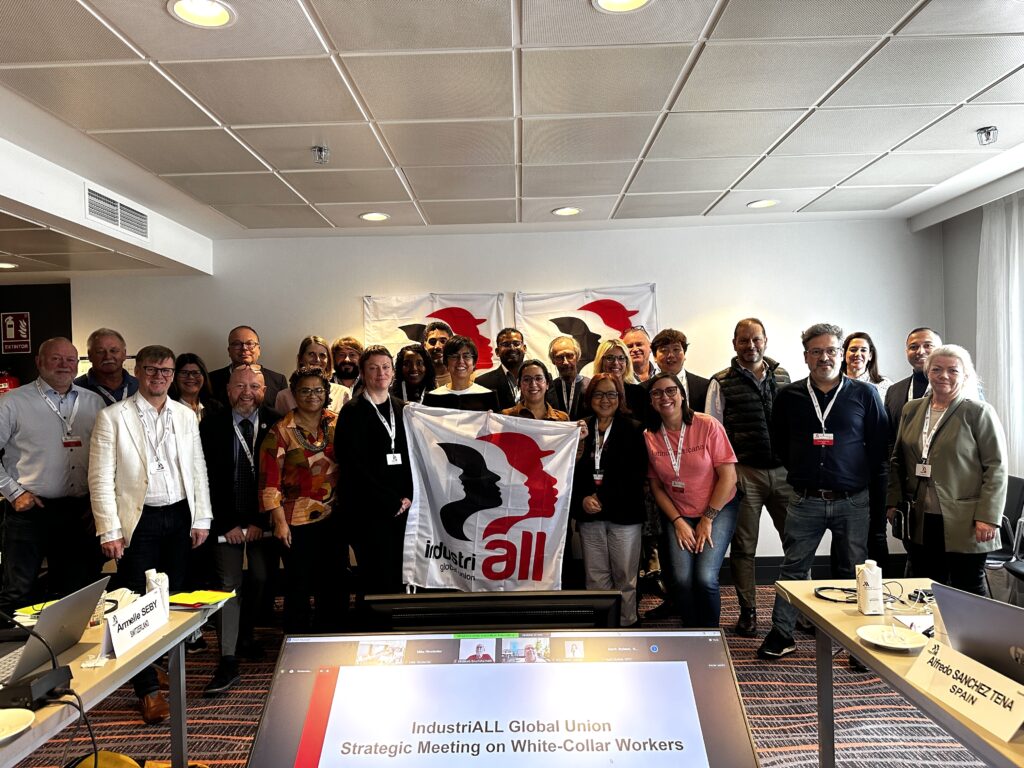2 November, 2023Organizing, reskilling, artificial intelligence and mental health were items on the agenda at IndustriALL’s first strategic white-collar workers meeting, since 2017, held in Madrid on 26 and 27 October. 70 participants, online and in person, exchanged their different realities, needs and expectations regarding the world of work and how to make trade unions more relevant for white-collar workers in Sciences, Technology, Engineering, and Mathematics (STEM).
“Industry 4.0 is changing the working world, and the white-collar sector is growing, urging IndustriALL to become more proactive in organizing and addressing the issues that these workers are confronted with. Our job is to strategize on how to address these challenges, especially the right to disconnect during telework, the transformation to a more digital world, and making the trade union movement attractive to young workers. We need to be attractive to young workers, our existence and relevance depends on it.”
Said Christine Olivier, IndustriALL assistant general secretary.
IndustriALL assistant general secretary Kan Matsuzaki joined online and set the scene by giving an overview of the situation for white-collar workers in a changing world. He focused on trends like industry 4.0, climate change, platform economy, the challenges and which tools were needed to make trade unions more attractive.
“The number of white-collar workers is expanding, and blue-collar workers are declining in our sectors, if we can’t organize white-collar workers our trade union movement is in trouble. We must look at how we can also use the Human Rights Due Diligence rules as a tool to organize white collar workers,”
says Kan Matsuzaki.
Discussions covered overcoming obstacles and inclusivity, skills, employability and job security in the digital world. Participants from Spain, Japan, South Africa, Singapore, Morocco and Sweden participated in panel discussions, highlighting the importance of changing the narrative that white-collar workers can’t join unions, the need for advocating for hard core skills, the importance of including young employees and establishing childcare facilities.
IndustriAll European Trade Union explained a current project they are conducting together with a Finnish university, to better understand the aspirations of white-collar workers. They will develop a toolbox for IndustriAll Europe affiliates on organizing white-collar workers.
ILO expert, Dr Hamzaoui, presented existing ILO standards that address mental health. The president of Eurocadres, Nayla Glaise, presented their campaign for the adoption of a European directive on protecting the mental health of workers. This session centred around working time and increased pressure on workers and the inclusion of the right to disconnect in collective agreements.
Swedish union, Unionen, made a presentation on the Swedish agreement which provides upskilling and reskilling for white-collar workers. This agreement is key to enabling high skilled workers, who are exposed to new developments, to keep up with the skills requested by new technologies, retain their employability and transition to new jobs. Much of the outcome from this panel included, finding strategies to help older workers adjust to new technologies and mental health focusing on including the right to disconnect in collective agreements.
The second day of the meeting focused on organizing in a digital world. Unions from Australia, Ghana and Brazil made presentations on how they use technology to organize. Participants raised the challenge of reaching the members who are further away, so they use technology to assist members. Digital newspapers, WhatsApp and Telegram groups are used to recruit members.
Massimo Mensi, policy adviser on digital technology at Uni Global Union, presented new challenges for workers and their trade unions regarding artificial intelligence and algorithm management. Emphasizing that artificial intelligence will have an impact on workforces in sectors like technology, banking, and education including in terms of the protection of personal data and the right to privacy, and that it was important for trade unions to find tactics to beat these challenges.
“White-collar workers in STEM need better training to keep up with rapidly evolving technologies. Re-skilling is key for older employees to keep their employability. Mental health must be a priority. These workers need a better work-life balance. On all this issues, it is also important to develop a gender perspective to address women in STEM priorities. Gender equality is essential,”
says Corinne Schewin, IndustriALL co-chair for white-collar workers.






